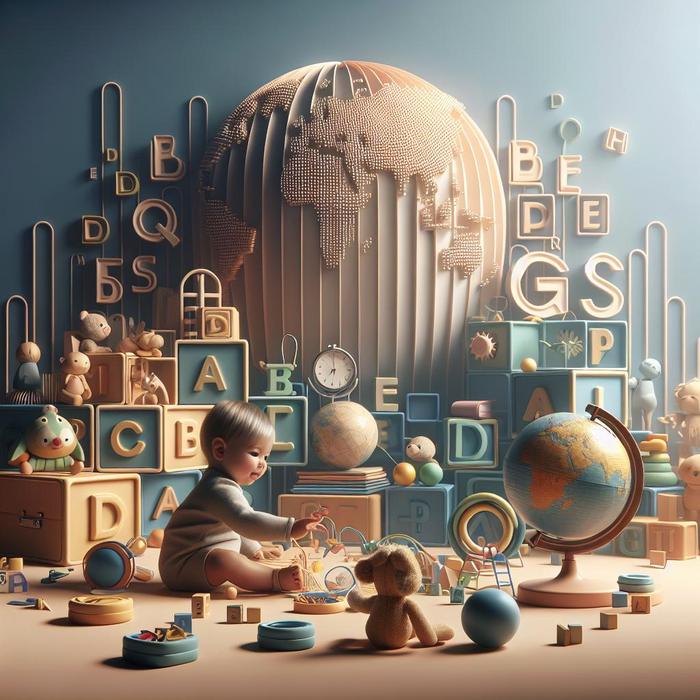The Importance of Encouraging Curiosity in Babies
The early years of a child’s life are filled with a plethora of learning experiences, and a key component of this developmental journey is curiosity. Today, we will discuss the role of encouraging curiosity and providing a rich environment filled with baby learning activities. We’ll also cover various strategies for helping your little one to start exploring new things.
Why Is Curiosity Vital for a Baby’s Development?
Curiosity is more than just a desire to discover. It’s a vital element in the cognitive development of babies. This inquisitiveness drives your baby to explore and learn about their surrounding world. The good news? It’s a trait we can nurture and develop in our little ones.
Simultaneously, encouraging curiosity also promotes major developmental milestones. It helps in improving motor skills as babies reach, grasp, crawl, and walk to investigate their surroundings. It also supports cognitive development as they learn cause-effect relationships and problem-solving skills.
To understand more about nurturing curiosity, you can check this article on ZeroToThree.
Stimulating Play and Activities
Providing an array of stimulating activities is a crucial part of encouraging curiosity and can also be a great deal of fun. Here are some ideas:
- Interactive toys: Toys that make noise, light up, or move can be fascinating for babies. These types of toys can also stimulate your baby’s sense of touch, sight, and hearing, encouraging them to explore further.
- Books: It’s never too early to introduce books to your child. Babies will be captivated by the bright colors and different textures of a book. Plus, reading to your baby is an excellent way to develop their language skills.
- Music: Music and sounds captivate babies. Instruments or toys that make music can be a great source of entertainment and learning. Dancing with your baby also helps with motor development. Here are some more ways to encourage your baby’s curiosity and exploration.
Openness to New Experiences
When it comes to fostering an environment of curiosity, openness to new experiences is key. By being open to these experiences, we can help our babies discover their interests and passions. This might include taking your baby on a walk to explore nature, or allowing them to touch different textures. You might also consider taking your baby on a first beach vacation or exposing them to a variety of foods to develop their palette (you may find our post on identifying baby’s food sensitivities helpful).
Whatever you choose to do, remember that the goal is to provide an environment that is safe and supportive, where your baby feels secure to explore and learn.
Parental Role in Encouraging Curiosity
As a parent, we have the integral role of guiding our babies as they begin exploring new things. Every action we take can model curiosity. When we express wonder and interest, our babies will follow suit. Curiosity comes from the joys of discovery, and we can help foster that joy.
For more practical tips on how to develop your child’s curiosity, we recommend reading Mayo Clinic’s article discussing some effective strategies.
It’s important to remember that, just like us, babies have different personalities and preferences. Some might be naturally more curious than others. Regardless of your baby’s disposition, providing stimulating activities and a supportive environment can help nurture a love of learning and exploration.
The Impact of Curiosity on Brain Development
According to the Sanford Health News, curiosity plays a crucial role in early brain development. Babies learn by interacting with their environment, forming new neural connections as they explore and discover. This sense of exploration and curiosity helps babies to develop their language, motor, and cognitive skills rapidly.
Role of Natural Surroundings in Inciting Curiosity
Natural surroundings stimulate curiosity in babies in a profound way. The textures, sights, and sounds of the outdoors invoke a sense of wonder in babies, leading to exploration. This exploration further promotes physical development and encourages cognitive and sensory growth.
Nurture a Curious Mind: Tools and Strategies
To nurture a curious mind, parents can employ various strategies and tools:
- Engage in Responsive Interactions: Pay attention to your baby’s cues and respond with enthusiasm. These interactions can include responding to a baby’s coos and babbles, celebrating a baby’s new skill or exploration, and more. These responsive interactions contribute to creating a secure bonding, enabling the baby to explore and learn fearlessly.
- Open-ended Questions: While interacting with your baby, ask “what”, “how”, or “why” questions. Although babies might not understand these questions entirely, they will latch onto the tone and rhythm of your voice, thereby promoting language development and early literacy.
- Offering Choice: Even in infancy, offering choices can foster independence and incite curiosity. Offering choices in toys, clothes, food etc, gives babies a sense of control and thus encourages exploration.
The Influence of Science Learning in Infants and Toddlers
There is ample research suggesting the benefits of early science learning in infants and toddlers. According to the Office of Head Start Early Childhood Learning & Knowledge Center (ECLKC), science learning in early childhood encourages children to become keen observers and problem solvers. It helps them understand their world and fuels their natural curiosity. Science learning can be integrated into everyday activities such as exploring objects, examining natural environments, building structures, and investigating simple machines.
Overall, We Nurture The Mind That Explores
In conclusion, babies are innate explorers, and as parents, we hold the beautiful responsibility of nurturing this exploration. Encouraging curiosity might seem challenging, but with patience, responsiveness, and consistency, we can create a secure and stimulating environment for our little ones. As the article on the Harvard Graduate School of Education website suggests, curiosity fosters ongoing learning and adaptability, equipping children with critical skills for lifelong success. So, let’s harness the power of curiosity to foster a lifetime of exploration and learning for our babies
